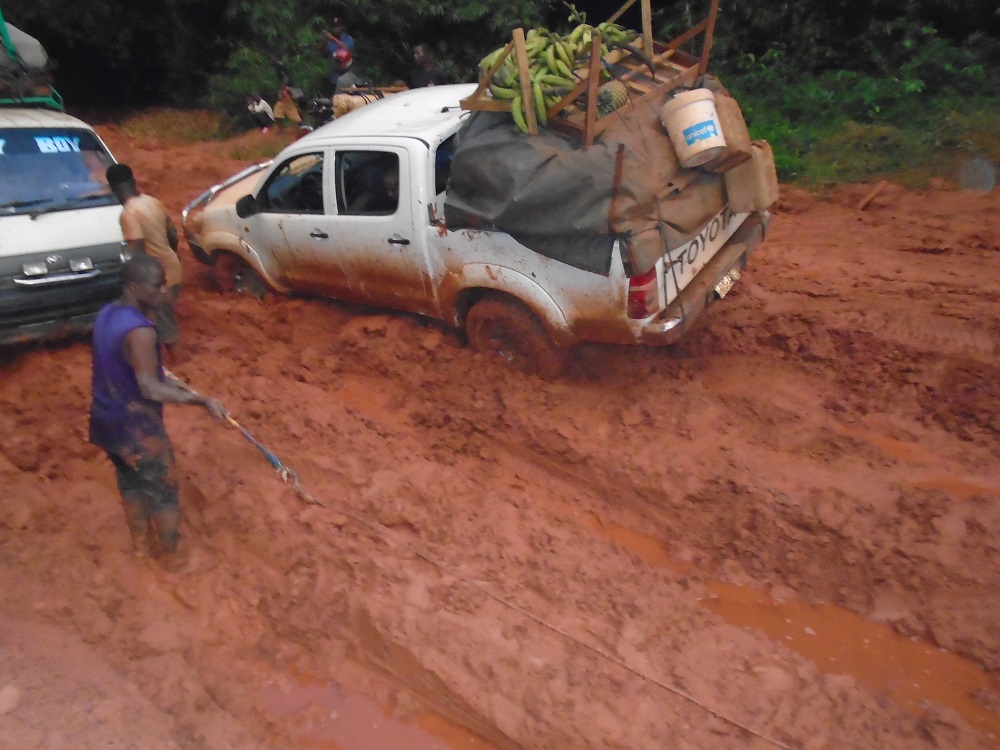By Edwin Faya, III Contributing Writer
The challenges business people face doing business in rural Liberia are enormous, with the roads in many parts being virtually impassable especially during the rainy season.
Liberia’s northwestern Lofa County is one area where the condition is general consensus in the business community can be summed up in a simple phrase, “Nightmare in Paradise,” owing to the deplorable conditions of that county’s highways and farm-to-market roads.
The challenges of doing genuine business in Lofa County are grave, especially regarding access to good roads to effective delivery of goods and services to end users, the citizens and residents.
Trends in the Liberian business arena have taken a positive turn with the opening of many foreign and Liberian-owned businesses in the form of small-holder enterprises and service-oriented endeavors. For example, the petroleum sector is dominated by Liberians, mainly by the nation’s precious jewels, young people.
There is no shortage of this essential and highly needed commodity, despite the huge road network challenges in conveying it to the provincial capital of Voinjama in Lofa County, owing to the deplorable nature of the major highways and farm-to-market roads.
However, players in the petroleum sector point out that the profit margin on the commodity is small and therefore needs maximum support and economic empowerment in the form of loans and micro-finance assistance, especially to small Liberian businesses in rural Liberia.
The local petroleum dealers also intimated that the problems associated with the business ranged from trust and confidence from large foreign and Liberian business people, especially the extension of credit and delivery assistance to small businesses operating in rural Liberia.
Another crucial problem identified by the business community in Lofa was the level of insecurity posed by a suspected band of criminals that continue to terrorize and intimidate residents and businesses, hindering their operations in the seven administrative districts of the county.
As an offshoot of the road predicament, another menace that has compounded the woes of the county’s businesses is the uncontrollable hike in transport fares imposed by commercial drivers and other vital public and private transport service providers to, from and within the county.
Looking forward, however, the Lofa business community expressed optimism in the goodwill of the Liberian Government and other major stakeholders in the greater business community to foster and support Liberian businesses, through which several good policies had translated into practical and concrete instruments over the years in the country.
Notwithstanding, the Lofa business community also sounded a note of caution to the Liberia Chamber of Commerce (LCC) to graduate from the age-old way of doing everything in the nation’s capital, Monrovia, and advised that the LCC decentralize its business activities to the benefit of the rural sector of the nation.
They also advised that business organizations established in Monrovia should work out concrete modalities that will include and serve rural businessmen and women, as they are also part and parcel of the greater Liberian economy and society.
There are enterprising young men and women in rural Liberia who have, over the years, worked hard and done business with success stories in both small and large business undertakings in the country.
As banks and other financial institutions are now extending their services to the rural parts of the nation, Liberian and foreign organizations with the requisite instruments, that facilitate the socio-economic empowerment of rural Liberians, should begin to see reason to extend all of their professional services to war-affected communities in the country.
In Zorzor and Voinjama cities in Lofa County, JET Trading Corporation, specialists in building materials, has taken the bull by the horn. It has established two stores in order to reduce and ease the hardship caused by the poor roads. People involved in building construction now have easy access to building materials.
Commenting on the risk factors in rural Liberia, the Lofa business community argued that many places in Liberia have hostile and crime-prone environments that discourage potential investors and successful Liberian business people from venturing into rural Liberia.
Taking into consideration the strategic location of Lofa County, which borders Sierra Leone and Guinea-Conakry, the Lofa business community asserted the fact that prospects for fantastic and profitable trade and commerce could not be over-emphasized.
Local business women are also making a significant impact and contribution to the business climate in Voinjama City and other administrative districts in Lofa County.
“Upgrade our roads,” the business women challenged the Liberian Government and the nation’s road network stakeholders. “We will reach the deprived and market-oriented communities in Lofa County.
“Access to rural and urban markets,” the business women added, “is critical to the growth, development and progress of the Liberian economy and a sustainable livelihood for rural Liberians.”
In their closing comments, the Lofa business community noted that the rapidly expanding establishment of large and small foreign businesses was a genuine manifestation of the great prospects of doing business in north-western Liberia.

